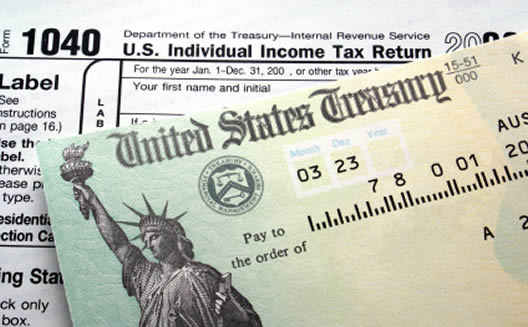No one, the eminent Judge Learned Hand wrote, has to pay one cent more in taxes than obligated.
However, millions of Americans have been doing that for years. That’s even though Uncle Whiskers and his merry band of persistent publicans always seem to be looking for Americans to pay more and more for a large and growing welfare/warfare state.
Indeed, for many Americans taxes are their biggest expense. Still, millions of them continue to give much more to Uncle Sam than they must.
That’s because they are giving the federal government year-long interest free loans and the loan amounts are rising. Once again this year many taxpayers are receiving huge tax refunds. The average refund is $3,117, the Internal Revenue Service (IRS) says. Last year the average refund was some $2,900.
I Loan You Money at Zero Interest
This pay more taxes than necessary practice amounts to giving the government an interest free loan for about 14 months, according to advisers.
Yet many Americans, facing big bills, continue this crazy practice.
“More than half of Americans either expect to get a refund or have already received one this year,” according to a new survey by Bankrate.com. It asked taxpayers what they plan to do with their refunds.
Most advisers and tax experts believe “loaning” the federal government thousands of dollars is bad money management.
“It’s amazing. You’re taking money out of the bank and investments, where it is making money and loaning it to the government. Then it is returning it at zero percent interest,” says Anthony Ogorek, an adviser in Williamsville, New York. “They should stop doing it.”
So why do so many citizens do it?
I Don’t Understand
Ogorek says many taxpayers are confused. They think they receive something in a refund. In fact, “they are just getting their property back that the government has been holding for over a year,” Ogorek added.
“A lot of people,” adds an adviser on Long Island in New York, “are averse to changing their tax withholding. They look upon this tax refund as a kind of forced savings,” according to Charles Hughes in Bay Shore, New York. But Hughes, who said a taxpayer should either owe or get back small amounts, warns that the big refund can cause problems. Many could have used this delayed payment, he notes. This is a point made by another tax expert.
“Some people who are overpaying taxes are owing on bills that could have been paid and avoided interest,” adds Kay Bell, a tax analyst with Bankrate.com.
What are people doing when they get their money back after more than a year of giving more than required?
Pay for Food and Other Things
Most poll respondents expect to pay down debt, spend more on necessities and save more with their refund dollars.
Only six percent of respondents said “they’ll splurge on a vacation or a spending spree,” according to Bankrate.com.
What should you do with your overpayment of taxes?
Bernard Kiely, a CPA and adviser in Morristown, New Jersey, said put yourself in a better financial position.
“The first question I ask someone who is getting a refund is do you have credit card debt?” he says.
Kiely says paying off card debt should be the top priority, followed by fully funding an IRA and building a cash reserve in case of sudden unemployment.
Get Rid of Card Debt
Other advisers all called for wiping out card debt. They noted that many consumers don’t understand that, by making minimum monthly card payments, it can take decades to pay off a debt.
Kiely said a person with a $5,000 card debt and only making minimum payments could take “decades” to pay off the debt. And that assumes one does not add any more debt to the card.
Maybe, another adviser suggested, these generous taxpayers providing the government with a year-long tax-free loan should consider how much better their finances would be if they stopped this practice. They could, he says, then afford to make more than the minimum card payment if each week they weren’t paying so much extra in taxes.
American Taxpayers Can Be Very Patient
Not only are many Americans willing to give the government the use of their money, but they are also patient about getting it back.
The same Bankrate.com survey said taxpayers, under certain circumstances, are willing to wait for their refunds if it improved the government’s efforts to fight identity fraud.
The Bankrate.com poll found that 22% of Americans are willing to wait for their refund up to 8 weeks, followed closely by 20% who would wait 1 to 2 weeks.
Fifteen percent said they would not be willing to wait any additional time to safeguard against refund fraud. The survey questioned a cross section of some 1,000 Americans.
![]()
